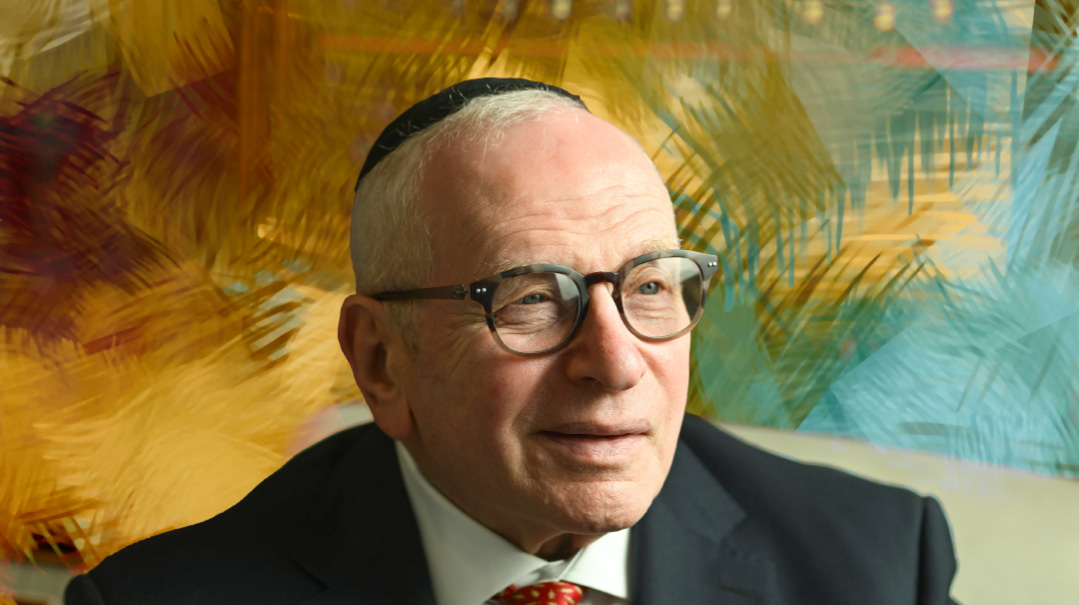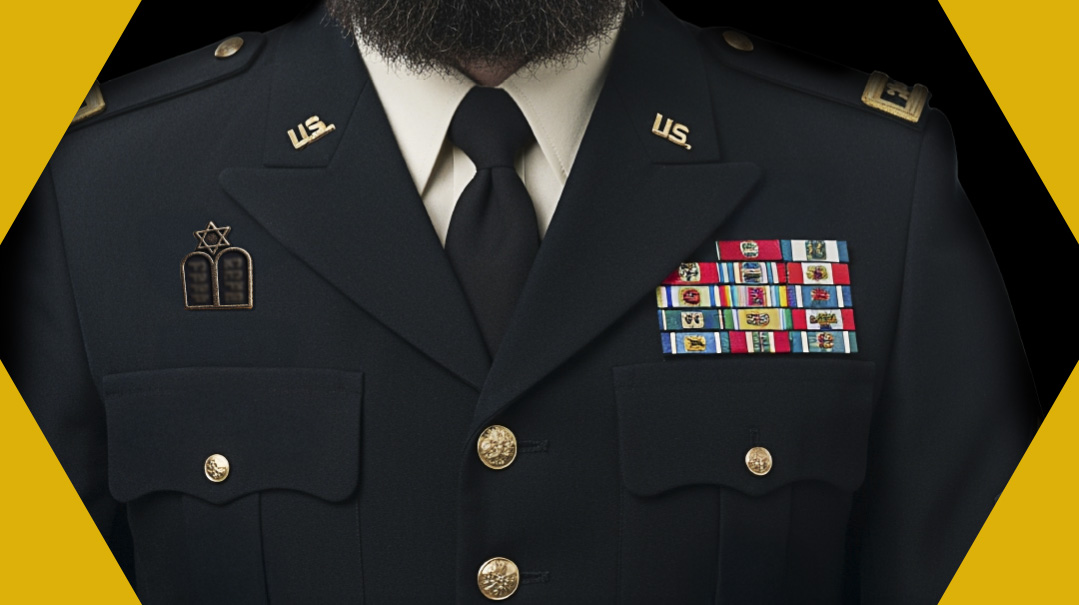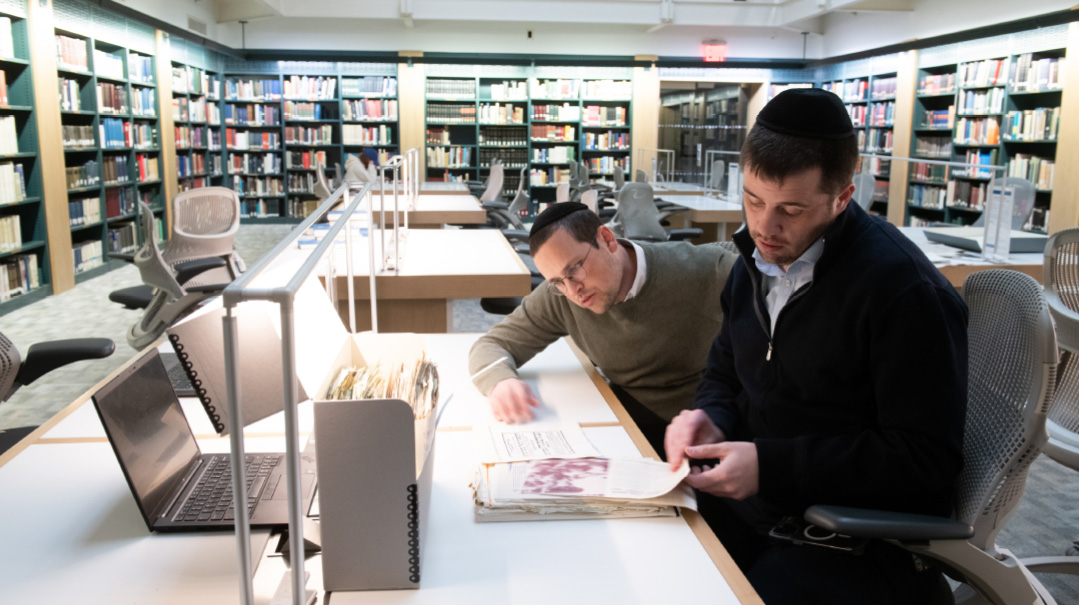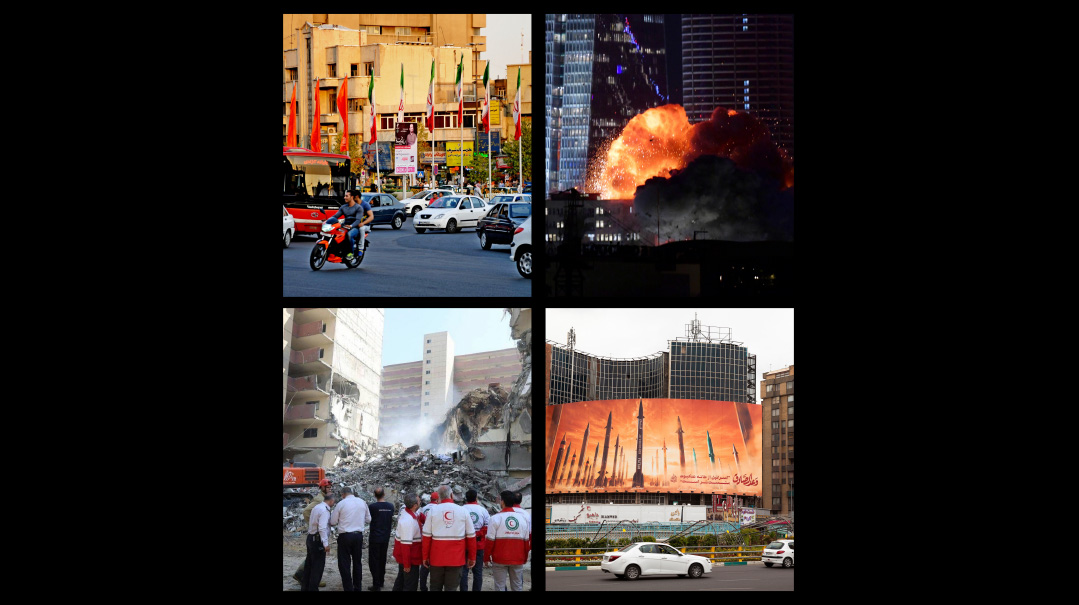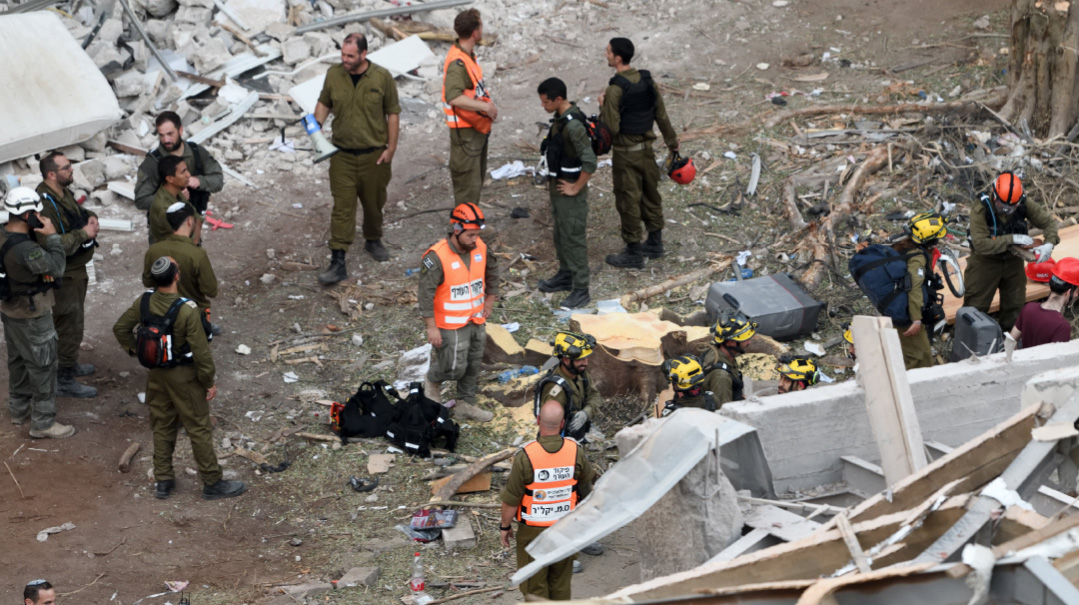Cleared for Publication
| February 6, 2024When Rav Baruch Rosenblum shared his distress over his wife’s illness with Rav Aharon Leib Steinman, the Rosh Yeshivah had one eitzah for him: “Go out there and inspire others.”
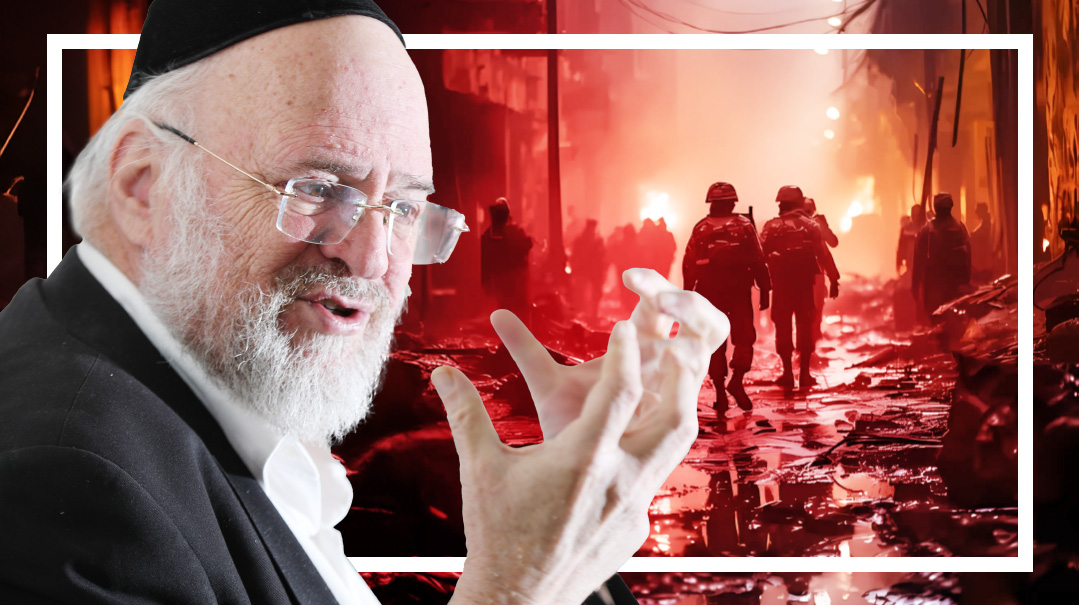
Photos: Menachem Kalish
It’s Thursday night in Bnei Brak’s Beit Knesset Hagadol, and just like every other week, the place is packed, as Rav Baruch Rosenblum leans on his shtender while cameras positioned opposite his face are poised to broadcast his words to dozens of locations around the world. This modern-day maggid speaks a language that’s part yeshivish, part vernacular, tying up Rishonim, Acharonim, and midrashei Chazal on the week’s parshah with his own powerful chiddushim and lessons for us to live by.
Suddenly, though, Rav Rosenblum stops. He closes the Chumash and speaks from the heart, a heart that’s feeling the pain of Am Yisrael in its suffering — with the hostages, the evacuees, the soldiers, and their families — anyone who’s in one of this war’s many concentric circles.
“These days,” he says as his eyes begin to tear, “every morning when we hear or look at the news, we’re faced with those words, ‘Hutar lepirsum — cleared for publication,’ and then there’s a name, or two or three or more. We’re so used to it already, but are you giving a second to think what those two words — hutar lepirsum — really mean? It means a widow, orphaned children, bereaved parents, entire families whose lives will never be the same. Another hutar lepirsum, and then another. And another. Hashem Yerachem!
“And what about the tens of thousands of evacuees from both the south and the north — people who have been living for three months with their spouses and children in a room and a half in a hotel, people out of work for three months — are any of you thinking about that?
“Think about a father and mother who have two or even three children in the army. They can’t sleep at night. Their phone is on, ready, 24/7, and the heart, oy, the heart, it skips a beat with every ring. But us? ‘Na, we’re in the center of the country. We’re safe. And besides, there’s Iron Dome, so everything’s good. Why worry? Nu, shoin, what do you want from me? I said Shir hama’alos mimaamakim after davening, I checked off the box.’
“But rabbosai, where is our sharing the burden? How can any of us sleep as if nothing is happening, when parents are sitting shivah for their sons, when children are sitting shivah for their fathers, when soldiers in Gaza are sleeping on the ground, on sand dunes? During World War I, the Chofetz Chaim didn’t sleep in his bed for even one night. Where are we? Our soldiers are fighting throughout the night, and we’re sleeping in our warm beds?
“What do I want? One thing: not Sinwar’s head, Hashem can take care of that in a second, make him step on a mine and get blown to smithereens. We need to ask for one thing: Hashem, send us Mashiach Tzidkeinu!
“Had we known ahead of time what was decreed for us to go through on Simchas Torah — would anyone have gone home during davening on Yom Kippur? We would have stood and davened from the beginning of the fast until the end, storming the Gates of Heaven with our cries! But we didn’t know. So, do we need to wait for war to break out on the northern front in order to cry over the fact that we didn’t sufficiently tear down those Heavenly gates with our tears? We can still do it! It’s not too late to storm Shamayim pleading with Hashem to annul this horrible decree!”
Rav Baruch Rosenblum, a popular maggid shiur and prolific author based in Bnei Brak, has been delivering shiurim to thousands across Israel and the world for over 20 years. And now, more than ever, as soldiers are fending off terrorist threats in the north and south while hapless Jews are trapped in Hamas dungeons, people in Israel are flocking to hear his messages, to find some rays of light, some meaning within this morass. While his words engulf his listeners with brutal honesty cushioned with a large dose of hope and revival, few know about the Rav’s own struggles as an overactive, rambunctious child trying to navigating a yeshivah system with standardized expectations.
Baruch Rosenblum was born in Bnei Brak in the spring of 1960. He says his childhood was no indication of the life he leads now as a renowned Torah figure. He describes himself as a restless, rowdy child, and the last thing he wanted to do was sit and learn.
“Parents of children who struggle to connect to the sweetness of Torah often come to me,” he says. “They want to know how to stimulate their child’s desire to learn and to invest effort, which is just not there. I plead with the parents to wait, just a bit more, a few years. I tell them that I also didn’t like to learn not so long ago. Sometimes we have to wait for the body to grow a bit, and the energy and ambition to balance out.”
As a teenager, Rav Rosenblum attended Yeshivas Itri in Jerusalem, and then moved on to Grodna for yeshivah gedolah. Although he admits that during his childhood he didn’t really connect to learning or to paying attention, he somehow found himself fascinated with Midrash and Aggadah, especially on the weekly parshah.
“It was the only thing that could keep me in my seat,” he says. “And later, when I heard a good speaker, I could stand riveted to my place. When I was in Grodna, I would listen to the shiurim of the Rosh Yeshivah, Rav Dov Tzvi Karelinstein, who was a gifted speaker. Aside from his regular shiurim, he also spoke regularly on Aggadah and the parshah.”
After he married Bruria Kahane, he settled into kollel life, but had a few sidelines as well. He learned safrus, and his knack for communication and skill with words led him to Yated Neeman, where he wrote Torah-based articles as well as obituaries and memorial tributes, all under the pen name B. Shoshan.
When he heard that someone had passed away, he would call the home of the widow and the children, and listen to stories about the niftar. The families were appreciative of the commemoration, and when he heard about a widow who was comforted by an article he wrote, it gave him tremendous joy.
He also began tutoring young students who were learning-challenged. “I would share my own past with the children,” he says, “how I was so vild and always jumping around. I would explain to them that there is nothing sweeter than the holy Torah, but the problem is that the mouth is filled with sour pickles. If we can disconnect from all the pichifkes that are constantly surrounding and distracting us, the pleasantness and sweetness of Torah will be felt right away.”
In the summer of 1996, it all turned around. Mrs. Rosenblum had taken her children to the beach for the day, and on the way back, she discovered that she was seeing double. Four lanes instead of two, two steering wheels instead of one, six daughters instead of three.
Subsequent medical testing led to a devastating diagnosis: Bruria Rosenblum was in the early stages of multiple sclerosis.
It was the first of many attacks of this degenerative disease. In the beginning, a series of treatments and medications were able to stabilize the situation and to restore some normality to their lives. But the treatment protocol could not arrest the progression of the disease, and the Rebbetzin, a special education teacher who had dedicated her life to special and struggling children, could no longer work or properly take care of her family.
Distraught, Rav Rosenblum approached Rav Aharon Leib Steinman ztz”l. He’d developed a relationship with the Rosh Yeshivah while he was an administrator of the Nesivos Moshe organization, which worked to place children from non-religious homes in Torah institutions.
Right before one of his fundraising trips to the United States on behalf of Nesivos Moshe, Rav Rosenblum asked to speak to Rav Steinman privately. “It was at dawn,” the Rav remembers, “just before the Rav began his daily routine. I came and poured my heart out to him. I told him about my wife’s illness, how we had young children at home, and begged the tzaddik for a brachah. Rav Steinman grasped my hand and stroked it softly, and then told me, ‘Let us daven that it will not get worse.’”
But Rav Rosenblum didn’t desist. “Rebbi! What should I do that it should not get worse?”
Rav Steinman looked into the pained eyes of the young man and said, “Zikui harabim — bring merit to the public. Get involved in zikui harabim.”
When Rebbetzin Rosenblum heard the instructions of the gadol hador, her response became their goal in life: “What will I have from you sitting next to my bed all day? Go out and be mezakeh the public!”
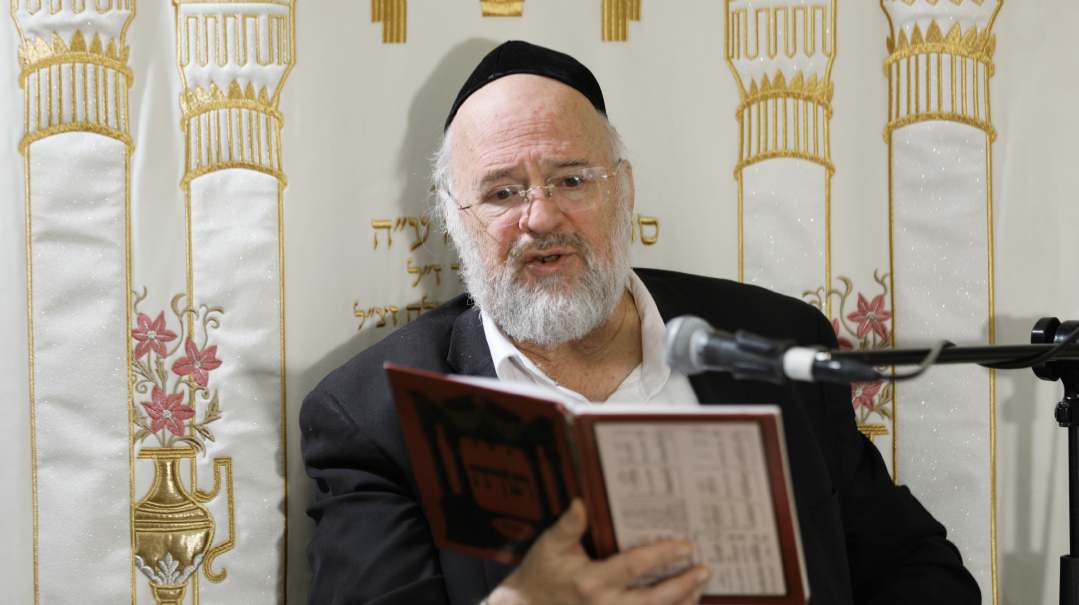
“Had we known ahead of time what was decreed for us on Simchas Torah, would anyone have gone home during davening on Yom Kippur?” Rav Baruch Rosenblum wants to wake us up
Armed with a brachah from the Rosh Yeshivah, Rav Rosenblum decided to dedicate himself even more to Nesivos Moshe. He was no public speaker at the time though, and the first time he actually gave over a shiur was when one of Nesivos Moshe’s speakers had to be away and asked Rav Rosenblum to stand in for him.
It was a parshah shiur for around five people from Ramat Hasharon. Something light, not pressuring. Simple, nice people who came out on Motzaei Shabbos to hear some insights, but nothing too deep or complicated. That sounded okay — anything more would cause a serious bout of stage fright.
When Shabbos ended, Rav Rosenblum headed for Ramat Hasharon. He went into the shul at the address he was given, and at first, he was sure there was a mistake. About 50 people were sitting and eating Melaveh Malkah, waiting for the guest speaker. Yep, this was the right place. “Please wash, and then we’ll hear the derashah,” the gabbai said solicitously. Rav Rosenblum almost swallowed his tongue. This is not what he had had in mind, but there was no way out.
With a bit of a tremor in his voice, the Rav began to speak, consoling himself with the fact that the crowd was busy eating, surely paying attention to the challah and dips, which meant that at least there wouldn’t be questions or interjections.
“When I returned home,” the Rav described that first experience, “I picked up the phone to the friend who had ‘organized’ all this and made it clear that I would not be doing it again. But he told me, ‘You have no idea how the people enjoyed your shiur. You’re a gifted speaker! No one else can do this. If you don’t go, the bittul Torah is on you.’ He’d boxed me in on all sides.”
It wasn’t long before those shiurim became the center of his life. And as the tzibbur got chizuk, the Rav began to publish those shiurim in a series of seforim titled Baruch She’amar; he also published a Haggadah Shel Pesach and several other works, while one shiur after another was added to his weekly schedule. Today, he gives regular shiurim in Bnei Brak’s Beit Knesset Hagadol, in Raanana, Givat Shmuel, Ramat Gan, Elad, Migdal Ha’emek, Be’er Sheva, Modiin, and Hadera, in order to fulfill that original charge of disseminating the light of Torah in Am Yisrael.
During busy times, like ahead of the Yamim Noraim when every Jew is looking to accrue more merits, Rav Rosenblum can give up to ten shiurim a day. The crowd spans the whole spectrum of the population — all the streams; communities, types of yarmulkes, and even those without yarmulkes at all, from shuls and batei medrash, to schools and seminaries, colleges, corporations, and army bases. In order not to pass over a single opportunity for chizuk, the Rav never turns down an invitation to speak — and he’s been doing it for 27 years.
Since the tragedy that struck Am Yisrael on Simchas Torah, Rav Baruch Rosenblum never misses an opportunity to address the need to hear the call being issued from Above. Some are looking to blame, others are trying to cash in on the political upheaval, but most of Am Yisrael is striving to strengthen themselves, each one in his place and at his level. To eternalize, to remember, and to change, even a little bit.
Rav Rosenblum is doing his best to channel that trajectory into people’s hearts. He says that there is a feeling that Am Yisrael is ill, and in order to heal, the nation needs to do two things: to daven like never before, and to understand what the disease is.
One thing he’s been speaking about is the unfathomable timing — Simchas Torah, the day the Zohar calls the “end of the maareches hadinim,” the judgment apparatus.
“The morning hours of Simchas Torah is the time when the maareches hadinim of the Yamim Nora’im comes to an end, after all the messengers received their kvitlach. HaKadosh Baruch Hu waited for the final moment, the second after the final moment. And right away — all the bechinos of Rosh Hashanah and Yom Kippur, the writing, the sealing, who by fire, who by water, who by animal, who by strangling, who in his time and who not in his time — it all erupted in a horrifying flood. Exactly at the hour the Heavens opened, the Gates of Gehinnom opened.”
And the Rav demands, asks, pleads and urges: “When the tragedy is so tremendous, with such chilling proportions, we must think about and understand why Hashem has done this to His people. Our hearts must tremble and cry out.
“HaKadosh Baruch Hu is speaking to us!” Rav Rosenblum cries. “It can’t just be happenstance. It can’t be that so many horrors, so much suffering and anguish, were created just because. These were horrific scenarios that no one has ever heard of, that the mind cannot fathom, and they happened all at once, on one day by such evil people. Tatte!!! Vos hoben mir getuhn as doz is mit unz geshen? — What have we done for this to happen to us?!
“There was a Holocaust here,” the Rav says in a voice choked with tears. “Just like Haman wanted to do. Like Hitler did 80 years ago. To destroy, to kill, and to annihilate all the Jews from young to old, women and children, on one day. Entire families have been decimated, eradicated from the earth. There are a million people currently living in the country whose lives have been destroyed. There is hardly anyone who doesn’t know someone who was killed. HaKadosh Baruch Hu is screaming to us!
“Twelve hundred people, perhaps thirteen hundred, were slaughtered on one day,” he continues with anguished passion. “Babies who never sinned. Thousands of people were injured. Hundreds were thrown in the streets, with no one to bury them. There’s no way to describe the brutality of these animals….”
Rav Rosenblum is known for wearing his emotions on his sleeve. They say that when he davens on the Yamim Noraim, you can fill a flask with his tears.
A week after the massacre, those emotions surpassed even his own threshold.
“In the haftarah of parshas Noach, the Navi notes the concept of ‘B’rega katan azavtich — For a tiny second I left you.’ HaKadosh Baruch Hu acts with hester panim for one small moment, a tiny and deathly painful moment. But there is a continuation to the pasuk. Although it is true that ‘with one small moment I have left you,’ HaKadosh Baruch Hu tells His people, ‘ub’rachamim gedolim akabtzeich — and with great compassion, I will gather you in.’ When we see the frightening intensity of that one small moment, it behooves us to understand and to anticipate that great compassion — which is indescribably tremendous — through which HaKadosh Baruch Hu will redeem us. B’rachamim gedolim akabetzeich!”
Rav Rosenblum analyzes the identity of the brutal beasts chosen to be the emissaries to carry out this most horrific form of Middas Hadin — the descendants of Yishmael, who despise Bnei Yisrael with a cruelty that defies human logic.
“The power of Bnei Yishamel is tefillah,” he says. “They pray five times a day, they bow and prostrate themselves in their prayers the whole year. What we do on one day, on the holiest day of the Jewish calendar, Yom Kippur — they do every single day of the year.
“The name Yishma-el, Yishma Kel, also alludes to tefillah. The reason he was called ‘Yishmael’ in the future tense (‘Hashem will hear’) is because the essence of Yishmael is to increase the power of tefillah through their heinous acts. Chazal say (Pirkei D’Rabi Eliezer 32): ‘Why is his name Yishmael? Because HaKadosh Baruch Hu will, in the future, hear the cries of the nation from what the sons of Yishmael will do in the Land in the end of days.’
“Every single thing that these animals do,” the Rav continues, “they attribute to the Name of G-d. When they carry out their brutal, bloodthirsty acts, they cry out the Name of G-d. It’s so that we should cry in tefillah.
“So what can we do? One thing is to strengthen our tefillah ever more. To daven with more sincerity, with less distractions, from Modeh Ani until Aleinu. To disconnect for a few minutes from all the devices that connect us to the outside world while we speak with the King. I would say this is one obligation that we have now.”
Rav Rosenblum talks about a certain disconnect between what we see and what we know. He quotes Dovid Hamelech’s lament in Tehillim 78, how Am Yisrael saw all the miracles in Mitzrayim, experienced the Exodus, were saved at Krias Yam Suf, and had water from a rock. They saw how Hashem controls the sea, the land, the heavens, the mineral, vegetable, animal, and human parts of existence, and they still asked, “Okay, Hashem gave us water, but can He also make bread appear in the desert?”
“How could they think that?” Rav Rosenblum questions. “Because the nature of a person is to just see what’s in front of him and not think further. You lived through miracles, but you still have doubts. That’s because we suffer from not being able to expand our brains. And until that happens, Hashem keeps sending us wake-up messages.”
Rav Rosenblum is doing his best to get us to wake up.
He shares an encounter he had with a taxi driver who had a crazy story when he was in the army: The platoon went to sleep, and in the middle of the night the guard who was on duty started screaming hysterically, waking up the others. They ran over and saw that a python had wrapped itself around the guard’s body and was about to strangle him. They were helpless — if they shot the snake, they’d shoot the guard as well. Suddenly, with his last breath, the guard shouted “Shema Yisrael!” and instantly the snake slithered off him, enabling the soldiers to empty their magazines on the offending creature.
“This fellow tells me, ‘You should see that soldier today. After that miracle, he was chozer b’teshuvah, today he’s a big rav with a long beard.’ So I asked him, ‘And what about you?’ He answered, a bit bewildered, ‘Me? I’m fine, why do you ask?’ I told him, ‘But you also saw this miracle, why didn’t you change?’ ‘Me? It didn’t happen to me, it happened to him….’”
Sometimes, says Rav Rosenblum, we just don’t make the connection. And that, he says, is why we mustn’t let the new level of unity that suddenly pervaded Am Yisrael since the outbreak of the war slip through our fingers.
“Before the tragedy, Am Yisrael was terribly divided and riven,” he reminds us, in case we’d forgotten the hatred and strife that abounded until the day of the attack. “If we want to have siyata d’Shmaya, to win this war against those who blaspheme the Name of Heaven — the murderers who attribute their acts to the Name of Hashem — we must be unified and whole. We can’t go back to that situation.
“We must strengthen our sense of nosei b’ol, of bearing the burden with our brothers. We must not abandon or ignore our brothers who are risking their lives day and night. We can’t let ourselves get used to this situation, to become complacent, to go back to ‘normal’ life. We must not allow the Satan to dull our senses. Instead we need to stand firmly in the face of evil, in the face of those who want to destroy us, and daven to Hashem to hear our cries.
“May it be that we should not need the Bnei Yishmael to have Hashem hear our tefillos. May this be the last catastrophe in the galus of Yishmael. So that we will no longer be in a state of ‘B’rega katan azavtich,’ and from now on may it be only be ‘b’rachamim gedolim akabtzeich,’ as we merit to welcome Mashiach Tzidkeinu speedily in our day.”
(Originally featured in Mishpacha, Issue 998)
Oops! We could not locate your form.

